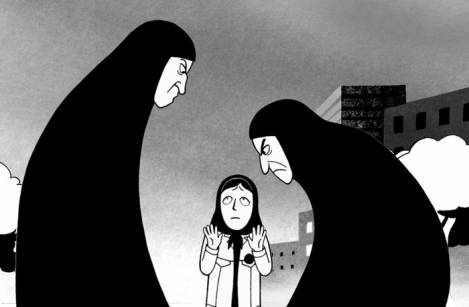 Persepolis, the graphic novel turned Oscar-nominated movie by Marjane Satrapi, has been shown in two cultural centers in Tehran but it will not be seen any time soon in Lebanon, where the censor fears its critical portrayal of Iran’s Islamic revolution might upset the Shia population. By RITA BAROTTA and GERT VAN LANGENDONCK BEIRUT, March 13, 2008 (MENASSAT)
Persepolis, the graphic novel turned Oscar-nominated movie by Marjane Satrapi, has been shown in two cultural centers in Tehran but it will not be seen any time soon in Lebanon, where the censor fears its critical portrayal of Iran’s Islamic revolution might upset the Shia population. By RITA BAROTTA and GERT VAN LANGENDONCK BEIRUT, March 13, 2008 (MENASSAT)
Cut to 2008, when the movie version of the same book is being kept off the screens at the request of the Censorship Directorate at Lebanon’s General Security.
We asked Bassam Eid, an official at Empire Films, the film’s distributor in Lebanon, what happened.
Was Persepolis effectively banned by the Lebanese censor?
"No. The censor asked us to be patient in releasing the film because the country is currently in a dangerous state."
They are asking you to be careful?
"Yes, they don’t want to create any problems."
Who could cause problems over the showing of Persepolis?
"The movie shows Shia intolerance in Iran and it was felt this could have a negative impact on Lebanon. We all know that the situation is dangerous in Lebanon right now, especially with the political vacuum over the presidency."
Did you see the movie yourself?
"Yes, we watched it before it was sent to General Security. We didn’t see any problem with the movie. But we should be patient with the state the country is in."
The movie will be screened in other Arab countries?
"Yes, it will be screened in Dubai. But there the government is in full control."
It is clear what is assumed here; that Hezbollah might somehow be given to violent reactions over the showing of a film which casts a bad light over its ally.
But are there any indications that Hezbollah or Hezbollah supporters in Lebanon would resort to violence?
Cartoon riots
It is worth looking back to 2005 when violent riots broke out in Beirut over the publishing of defamatory cartoons of the Prophet in a Danish newspaper; the Danish embassy was set on fire and the Christian neighborhood Achrafieh was ransacked.
But the rioters then were mainly Sunni Muslims, and even though Hezbollah leader Sayyed Hassan Nasrallah called for the protests against the cartoons to continue until Denmark apologized and Europe changed its laws, he also called his supporters off when things became violent. Sayyed Mohammed Hussein Fadlallah, the spiritual leader of Lebanon’s Shia community, even issued a fatwa banning attacks on private properties and Western embassies.
Tony Sfeir remembers that time well; the Arabic translation of Persepolis came out only days after the cartoon riots.
He never considered postponing its release, he said, "because the people involved in the rioting were not the ones who might have been offended by the book. And in any case those people are not known to react in such a way."
So why does General Security fear the reaction of Hezbollah to Persepolis?
The Censorship Directorate was not immediately available for comment.
At Hezbollah’s media office, the initial reaction was one of surprise.
"Can you spell that for me?" asked one of the secretaries at Hezbollah’s media office when we confronted her with the Persepolis question.
Dr. Hussain Rahhal, the head of Hezbollah’s media office, was also nonplussed.
"We have no information whatsoever concerning this subject," he said.
But he promised to look into the matter.
Hezbollah will have to score a pirated copy on the black market because the DVD has not been officially released yet.
"We’re still hoping for a DVD release in Lebanon," Gianluca Chacra of United Arab Emirates-based distributor Front Row Entertainment, which is handling the pic’s Mideast release, told Variety magazine.
Anti-revolutionary
Failing that, Lebanon will likely find itself in the same situation as Iran, where Persepolis is officially banned but pirated copies are widely available on the black market.
The Iranian regime has branded the film as "anti-revolutionary" and reacted furiously when Persepolis was awarded the jury prize at the Cannes film festival last year.
"Islamophobia in Western drama started in France, and producing and highlighting the anti-Iranian film Persepolis in Cannes falls in line with Islamophobia," said Mehdi Kalhor, a cultural adviser to Iranian president Mahmoud Ahmadinejad.
Surprisingly, Persepolis has been officially screened at two cultural centers in Iran.
"The aim of this screening is to end the delusions surrounding the film which have been created by the media," the Rasaneh cultural center’s public relations chief, Mahmoud Babareza, told Variety.
"When a film is not shown, people make all sorts of misconceptions. Cinema is cinema, after all, and it should not be put into a limited political context."



